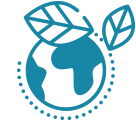Ad-hoc activities to integrate and implement sustainability
RIGHT HUB is able, both in Italy and abroad, to design, organize, develop and implement activities and initiatives to improve the environment and social impact related to events.
We support all the main stakeholders: promoters, organizers, locations, sponsors and partners, suppliers of goods and services in connection to sustainability.
The three fields of activity

Environmental
We will support you in the important objective of reducing your negative impact on the environment so as to safeguard our planet!

Social
We will support you in the important objective of improving your impact on the community, territory and people!

Stakeholders
We will support you in involving all your stakeholders, by inspiring them and improving their awareness.
Here are some examples, but not limited to fields where we operate (directly and through specialized partners):

Environmental
Climate Strategy
Planning and implementation of Carbon Neutrality and Net-Zero-Emissions strategies.
Carbon Footprint
Study and evaluation of the carbon footprint of goods, services, organizations and events. The evaluation is based on the LCA methodology.
Water Footprint
Study and evaluation of the water footprint of goods, services, organizations and events. The evaluation is based on the LCA methodology.
Separate Waste Collection
Planning and organization of the project to implement and improve Separate Waste Collection that may include for example the definition of the typology and placement of containers, the study and assessment of visibility and availability of them etc. The activity of waste collection is always carried out in collaboration with local operators and suppliers that deal with waste management.
Creative recycling
Planning and organization of initiatives to encourage the collection and recycling of materials widely used in events like PET bottles and tin cans.
Circular Economy
Planning and organization of circular economy initiatives in order to enhance particular materials used or waste produced during an event. For example recycling initiatives for coffee grounds or wasted cooking oils to create new products.
Plastic-free
Planning and implementation of strategies for the elimination and reduction of single-use plastic in organizations, working environments and events.
Green office
Planning and organization of aspects that reduce the environmental impact on office activities and consumption of materials.
Mobility
Planning and organization of initiatives in order to encourage sustainable mobility during events.

Social
Accessibility for disabled people
Support in checking and improving accessibility of structures.
Fundraising Campaigns
Planning and organization of charity initiatives for non-profit organizations and for emergency situations.
Collaborations with Schools and Universities
Planning and organization of initiatives for the involvement of students, schools and universities.
Diversity and Inclusion
Planning and organization of initiatives for the involvement of disabled, fragile or disadvantaged people.
Food surpluses
Planning and organization of activities for the collection of food surpluses to make a “Food Saving” event and organization (in collaboration with non-profit organizations).
Impact on the territory and the community
Study and assessment of the organization’s and event’s impact on the territory and community.

Stakeholders
Communication
Support for the definition and creation of contents for communication activities linked to sustainability, support for the definition and creation of sustainability reports.
Involvement of sponsors and partners (partnership with purpose)
Planning and organization of sponsor companies and/or partners of the event, and initiatives to reply to the demands of the sponsor companies and/or partners of the event communicating their commitment towards sustainability.
Spectators Engagement
Planning and creation of initiatives to inform and sensitize the public through on-site activities (e.g. info desks) digital tools (e.g. social networks), with modalities studied for all contexts (e.g. meetings, publicity materials, gaming, contests).
Engagement of operators
Planning and creation of initiatives to inform and raise awareness in the operators with modalities studied for all kinds of context.
Scouting of goods and services with a low environmental and high social impact
Support for the recognition, selection and choice of goods, services and suppliers according to the criterion connected to social and environmental impact.
Workshops and training
Planning and organization of workshops and training sessions related to sustainability.